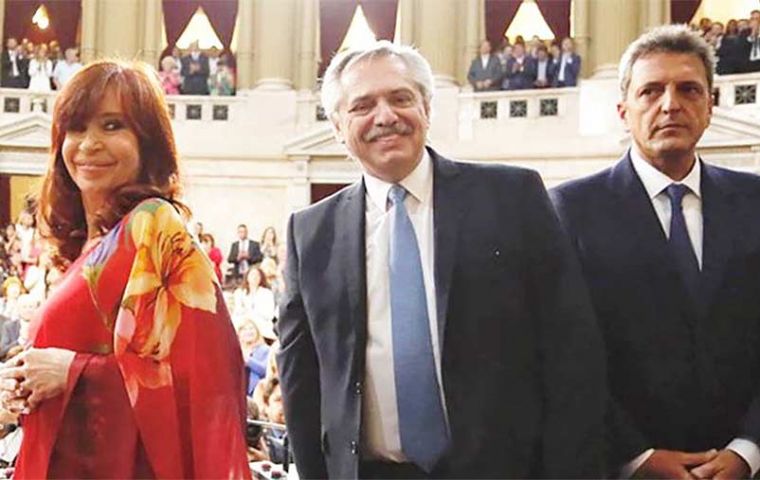MercoPress. South Atlantic News Agency
Argentina holding primary elections leading up to Dec. 10 Casa Rosada changeover
 President Fernández and CFK are both perceived as dead weight at Massa's camp
President Fernández and CFK are both perceived as dead weight at Massa's camp A total of 27 tickets have been competing since 8 am local time Sunday in Argentina's Open, Mandatory, and Simultaneous Primary (PASO) elections to decide who may run on Oct. 22 for the Casa Rosada's 2023-2027 term.
Some alliances have more than one set of candidates. For them, the PASO elections are about advancing or not while those with only one pair will still need to garner at least 1.5% of the votes to be there in October when, if no one reaches the constitutional majority, the two most-voted contenders will sort it out in the Nov. 19 runoff. In order for a ticket to win the October elections, it must obtain 45% of the valid votes or at least 40% with a difference of no less than 10% percent regarding the second-placed contender.
In addition to the presidency and vice presidency, 130 Lower House seats and 24 spots on the Senate are at stake.
For the PASO, each political grouping has no cap on the number of lists for the same office. In addition to UP and JxC, two other smaller alliances are deciding on their nominations for October, provided they make the cut.
Hence, the ruling Unión por la Patria coalition will choose between Economy Minister Sergio Massa and Cabinet Chief Agustín Rossi against Juan Grabois and Paula Abal Medina. According to local media, Massa's victory is only a formality.
On the other hand, the opposition Together for Change (Juntos por el Cambio - JxC) will truly be holding a competition between Buenos Aires City Mayor Horacio Rodríguez Larreta and Jujuy Governor Gerardo Morales on one side and former Security Minister Patricia Bullrich and Luis Petri from Mendoza on the other.
For many, this is the only issue reasonably at stake during the PASO, although the mouth-to-mouth and social media surveys MercoPress has accessed would favor Bullrich.
The Oct. 22 presidential elections would then pit these two contenders and La Libertad Avanza's Javier Milei and Victoria Villarruel vying for the two runoff spots, although Milei and other less known participants still need to achieve the mandatory 1.5% floor. With 35,394,425 Argentines over 16 years of age eligible to vote, 1.5% means 530,916 votes, which in practice means a smaller number, particularly with a poor turnout expected, since only the valid votes count.
Of the 130 deputies to reach Congress by Dec. 10, 35 will be from the province of Buenos Aires; 12 from the City of Buenos Aires; 10 from Santa Fe; 9 from Córdoba; 5 each from Mendoza and Tucumán; 4 each from Corrientes, Entre Ríos, Misiones, Salta, and Santiago del Estero; 3 each from Chaco, Chubut, Formosa, Jujuy, La Rioja, Rio Negro, San Juan, and Tierra del Fuego; and 2 from Catamarca, La Pampa, Neuquén, Santa Cruz and San Luis. UP has 68 seats at stake, while JxC will renew 49 seats combined among coalition partners PRO, UCR, and CC. The rest comes from minor and provincial forces not represented nationwide.
The 24 new senators will stem from Buenos Aires, Formosa, Jujuy, La Rioja, Misiones, San Juan, San Luis, and Santa Cruz. Voters will elect three senators per province, two will advance from the political force with the most votes, and the remaining one will be from the alliance right behind.
Also at stake in October will be 43 seats on the Montevideo-based Mercosur Parliament (Parlasur) in addition to some provincial and municipal authorities.
The elections logistics for the transportation of 106,659 ballot boxes to 17,431 polling stations involved all sorts of vehicles, including 60 mules, 52 tractors, and 15 boats, it was reported.
The PASO elections are a thermometer of the Argentine people's dissatisfaction with politicians. Coupled with a growth in the number of far-right contenders is the fear of high percentages of abstention and blank votes.
A poll published by El Cronista forecasts Massa would be the most voted option Sunday (24%) followed by Bullrich (20%), Milei (19.5%), and Rodríguez Larreta (16.3%)
In this scenario, President Alberto Fernández is slowly fading off and limiting his public appearances to protocol ceremonies and to the preparation of his last trips abroad, thus leaving the spotlight on Massa after canceling his reelection bid due to the rampant inflation and an inside war waged against him by Vice President Cristina Fernández de Kirchner (CFK). President Fernández and CFK are both perceived as dead weight at Massa's camp.




Top Comments
Disclaimer & comment rulesCommenting for this story is now closed.
If you have a Facebook account, become a fan and comment on our Facebook Page!